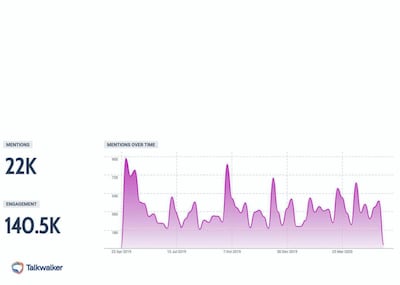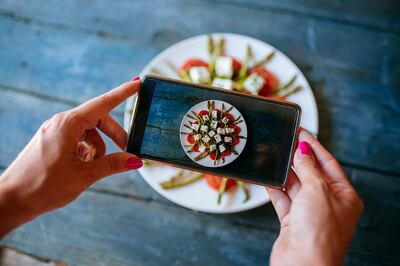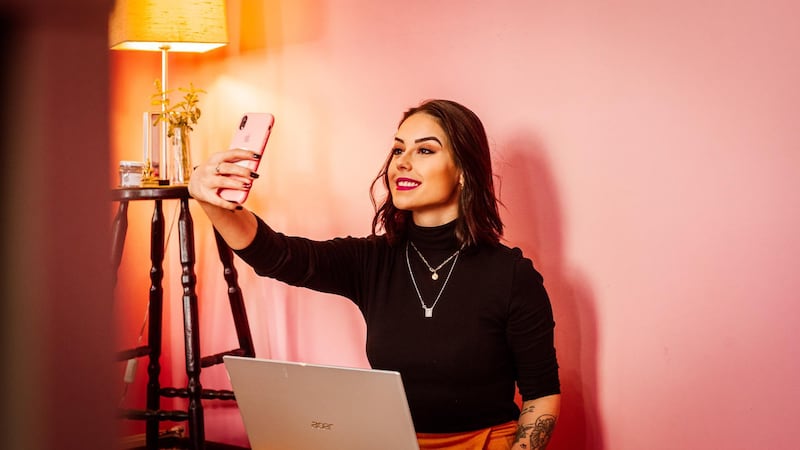Dubai has fast become a hot spot for global influencers, and no wonder – it's a regional hub for international brands, has a balmy climate and is at the crossroads of East and West.
The city's vast and varied population of content creators tell stories about travel, motherhood, food, fashion and more.
But, when there are so many voices, it can be hard to know who is worth listening to.
_________________
Read more from our 'The State of Influence' series:
[ The world has changed. So, surely, influencers will have to evolve, too? ]
[ 'Everyone wants to be an influencer': UAE social media stars on the realities of their day job ]
[ Fake followers and buying engagement: influencer trickery may be coming to an end ]
_________________
Internationally, influencers are big business: the industry was worth $8 billion (Dh29.38bn) in 2019, with market analysts at the time predicting a $15bn industry by 2022.
But over the course of the pandemic, change has been afoot. Some wondered if it would survive at all, given that throwback photos are a finite resource.
So what does the future of the industry look like in the region? We spoke to experts in the UAE to get an idea.
Late last year, communications agency BPG Group and market research firm YouGov released the results of their 2019 Social Media Influencers’ Survey on the UAE and Saudi Arabia: 85 per cent of respondents said they follow social media influencers.
But 79 per cent of these people had unfollowed influencers due to increased promotional content.
Roozbeh Ali Kafi teaches the Social Media Influencers Diploma Programme at American University in Dubai. He believes the pandemic could provide a watershed moment for a burgeoning industry in the UAE.

"It's going to bring a positive impact," Ali Kafi says. "They all need to think about having more meaningful content. What we will see more of is how to adapt to this lifestyle. How will the world look?"
However, he doesn't agree with the widely held belief that the influencer market is saturated in the UAE. If anything, we don't have enough.
"There are so many people who want to be influencers, but they don't actually influence anything. They are promoters," he says.
"Dubai is full of promoters. Influencers are those who people look up to and who create original content."
Are influencers still influencing? Why throwbacks can be tone deaf
The 2020 State of PR report from social media analytics tool Talkwalker noted that 67 per cent of PRs used influencer marketing globally. Here in the UAE that figure is higher at 78 per cent.
Lama Abdelbarr, spokeswoman for Talkwalker, mapped the number of mentions of the term "influencer" online over the past year and found that it has almost halved between April 2019 and April 2020.

While this might not be indicative of an industry decline just yet, Abdelbarr warns that it could be if things don't change.
"One of my major red flags at the moment is influencers who are constantly posting ‘throwback’ posts to ‘better times’. They were clearly stumped by not having access to the usual frills and thrills and are now recycling reserves of images and videos.
"Instead of facing the current situation, these influencers are taking an easy route and operating on auto-pilot. It's lazy and tone deaf," she says.
"This is actually a crucial moment. Influencers that manage to go the extra mile to prove their relevancy and their pure engagement figures without the fancy hotel stays, picturesque travel backgrounds or mouth-watering food arrangements send a very strong message about their value."
This could mean a seismic shift in the way the industry works in the future – including how each party benefits from the arrangement.
"The days of sending freebie packages and having a quick call to brief the influencer in simple terms, and sometimes writing the social media copy on their behalf, should well and truly be behind us," Abdelbarr says.
Influencing during a pandemic: are restaurants giving away free food?
The influencer business model has traditionally centred around two options: a brand sending free products or food for a person to promote across their channels or, if they are popular enough, a paid partnership.
But brands have tightened their belts recently. One of the largest industries for freebies is the restaurant industry. It's also one of the hardest hit by the pandemic.
The National spoke to 22 of Dubai's most well-known restaurants, on the condition of anonymity, about their dealings with influencers over the course of the pandemic.
Since March, 18 of them have received requests for free food from self-professed influencers in exchange for social media posts.
One restaurant PR said an influencer was invited for breakfast, and after being warned the business was struggling, still proceeded to spend Dh800 for two people and "left with five bags of takeaway food".
But, on the flip side, they said other influencers who usually charge for posts were now accepting food and posting for free.
Another restaurant PR told The National they had about 150 requests across three restaurants for free food during the pandemic. Some influencers had requested payment, as well as free food. Others had threatened retribution in the form of negative reviews if they were rejected.

One JLT outlet, which says it is getting "several requests a day" is popular food hall concept Streetery. However, managing director Nicky Ramchandani says influencers are also central to his business.
"In my opinion, there are two types of influencers: the type that are just looking to be an influencer without considering the value they add to the business, and the type that understand what value they bring to the people they work with."
Streetery said food bloggers had recently been "instrumental" in urging people to order direct from restaurants and not aggregators.
"We hold so much respect for people like this," Ramchandani says.
The change was coming pre-Covid: why influencers get so much hate
In 2014, influencer marketing agency Bukhash Brothers was working on huge campaigns, most notably bringing celebrities such as Gigi Hadid, Selena Gomez and Kendall Jenner to Dubai.
However, in the years since, the UAE market had become saturated, according to company founder Anas Bukhash. Budgets were declining, and clients were turning to traditional advertisements, as they yielded more control and could "avoid the perceived ‘hassle’ of working with ‘real people’".
"More importantly, many brands didn’t work with influencers very effectively. Many aspects of the process were often overlooked and slipped through the cracks, resulting in negative impressions."
But Jamal AlMawed, founder of PR and influencer agency Gambit Communications, believes there is "a global cloud of negativity hanging over the concept of influencers which is in most cases unfair". Pre-Covid, he notes, the industry was "absolutely booming", however, that comes with disadvantages, too.
"In our region, we had reached a very dangerous phase where they were replacing media in the majority of brand’s spending plans, forcing media to downsize or go out of business, which is never a good thing. Influencer fees were rising rapidly and we saw a lot of price inflation across the region."
But as belts were tightened with the onslaught of a worldwide lockdown, AlMawed notes that influencer campaigns were the first to go in many company's marketing budgets. That has changed as time has worn on, and brands have realised people have more scrolling time at their disposal.
"Now when you look at your feed, you will most likely see influencers cooking, doing home workouts, cleaning and disinfecting, laundry, online shopping and enjoying streaming platforms. Look closer and you'll see a product being promoted," he says.
The 2019 YouGov survey that analysed 1,000 female and male respondents, aged 18 to 35 across the UAE and Saudi Arabia, certainly speaks to that.
It found that three-quarters of respondents purchased something from a brand because it had been mentioned by an influencer. The same amount discovered new trends via an influencer, and a whopping 78 per cent of respondents followed a brand on social media due to an influencer’s post.
But not all reviews are created equal, however: close to 60 per cent of respondents were less likely to trust an influencer's recommendation if they were paid to advertise it.
Could influencer income drop permanently?
Pre-Covid, if you were serious enough about it, influencing was big business.
"It depends on number of followers and goes up proportionally as followers increase," AlMawed explains. "If we take 10,000 followers as the lower cut-off for the term 'influencer', then they can charge as little as Dh500 to Dh1,000 for a post. As you get into bigger numbers, it can go as high $5,000 (Dh18,366) to $10,000 for a post with the region's A-listers."
However, several influencers that The National spoke to have had to drop their rates during the pandemic: AlMawed says they need to get used to it.
"It might take some time for them to accept the adjustment, and obviously some will have stronger bargaining power than others, but eventually the market will get a much-needed adjustment, as prices were hugely inflated."
So could this mean the resurgence of traditional marketing?
Brands are now being educated against using "vanity metrics" such as reach and engagement as markers of success, as they are easily tinkered with, Abdelbarr notes. She hopes the PR industry will now look at "health of engagement, daily active users, and fluctuation over time".
This shift could then "put traditional media back on the map as a strong contender when it comes to influence".

"PR professionals can now prove the value of media coverage that links back to brand websites or product pages. And the results are often phenomenal."
Academic Ali Kafi also objects to the opinion that influencers could eventually mean the end of the mainstream media industry. "There is still a big demand for proper, mainstream news. For instance, for Covid news, I would never go to an influencer, I would go to traditional media, they are the sources here you can trust."
This is why he is quick to point out that the act of being influential isn't reserved for individuals. Media companies can influence people, as can brands.
"If I'm a brand, all I am thinking about is how to reach my audience. Business people don't care about the authenticity of the platform they just want to reach people," he says.
So, what's the solution?
So how can influencers, brands and audiences all be catered to going forward? While some flippantly forecast the imminent demise of influencers in conversation, the marketing professionals we spoke to say that is simply not going to happen.
But the business model may change: one idea that has been mulled over is paying influencers at the end of a campaign, depending on how successful their referrals are.

"The bottleneck is getting the influencers to move forward with this type of agreement, which is riskier and less immediately gratifying for them," says Abdelbarr.
AlMawed, however, believes the industry should move to a "hybrid model": paying a basic fee to the influencer, and then releasing further payment when they can prove sales.
And in all, they can cop a lot of flak, but Natasha Hatherall-Shawe, founder of TishTash marketing agency, says "people do not give influencers enough credit".
"Good influencers are agile and creative and are able to pivot their content to what their audience wants. We as consumers, more than ever, want to feel connected to each other, and influencers give us that.
"Don’t underestimate the influencer, at least not the good ones."










